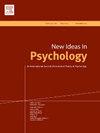自述能促进健康心理学研究吗?
IF 2.9
3区 心理学
Q2 PSYCHOLOGY, EXPERIMENTAL
引用次数: 0
摘要
虽然自述民族志可以提供对主观经验的独特见解,但一些研究人员认为它缺乏普遍性和科学严谨性。本文认为,从理论角度看,自述民族志是一种在认识论上站得住脚的方法。从本体论的角度来看,它是有价值的,能够丰富健康心理学研究,为患者、护理人员和从业人员提供其他方法可能无法完全获得的有关姑息治疗和治疗方法以及疾病经历的描述。本文章由计算机程序翻译,如有差异,请以英文原文为准。
Can autoethnography enhance research in health psychology?
While autoethnography can offer unique insights into subjective experiences, some researchers view it as lacking generalizability and scientific rigor. This essay argues that autoethnography is an epistemologically defensible method from a theoretical standpoint. Ontologically, it is valuable and capable of enriching health psychological research by providing accounts of palliative and curative treatments and illness experiences for patients, carers, and practitioners that may not be fully accessible by other means.
求助全文
通过发布文献求助,成功后即可免费获取论文全文。
去求助
来源期刊

New Ideas in Psychology
Multiple-
CiteScore
4.80
自引率
3.80%
发文量
37
期刊介绍:
New Ideas in Psychology is a journal for theoretical psychology in its broadest sense. We are looking for new and seminal ideas, from within Psychology and from other fields that have something to bring to Psychology. We welcome presentations and criticisms of theory, of background metaphysics, and of fundamental issues of method, both empirical and conceptual. We put special emphasis on the need for informed discussion of psychological theories to be interdisciplinary. Empirical papers are accepted at New Ideas in Psychology, but only as long as they focus on conceptual issues and are theoretically creative. We are also open to comments or debate, interviews, and book reviews.
 求助内容:
求助内容: 应助结果提醒方式:
应助结果提醒方式:


